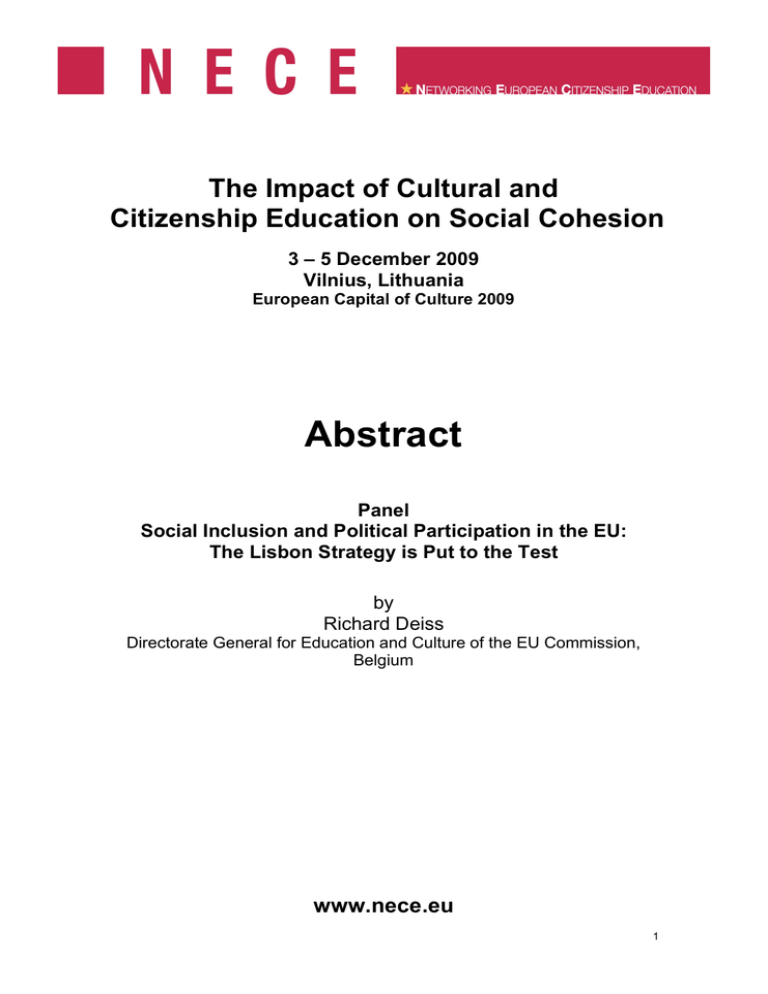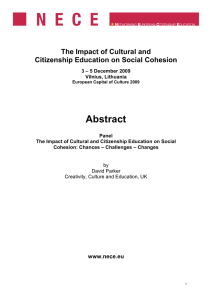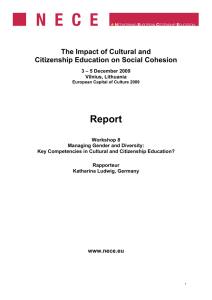Abstract The Impact of Cultural and Citizenship Education on Social Cohesion
advertisement

The Impact of Cultural and Citizenship Education on Social Cohesion 3 – 5 December 2009 Vilnius, Lithuania European Capital of Culture 2009 Abstract Panel Social Inclusion and Political Participation in the EU: The Lisbon Strategy is Put to the Test by Richard Deiss Directorate General for Education and Culture of the EU Commission, Belgium www.nece.eu 1 EU policies in the field of education and active citizenship The Lisbon European Council of March 2000 listed not only the creation of a knowledge based society, but also greater social cohesion among the goals to be achieved by 2010. Since then, fostering social cohesion and more active participation by citizens in social and political life has become an important issue of EU and national policies. The refocus of Lisbon on promoting growth and jobs in 2005 has not fundamentally changed this. The recent financial crisis makes the consideration of social cohesion even more important. Among the driving forces behind the growing attention paid to cohesion and active citizenship after 2000 there has been demographic change, with an increasing share of migrants among the population, technological change, changes of family structures and a growing risk of alienation, especially of young people. The increased attention given to social cohesion and active citizenship is, amongst others, reflected by the creation of the EU's Europe for Citizens programme (2007-20013, originally the working title was Citizens for Europe) that aims at giving citizens a key role in the development of the European Union. Its four action programmes are Active citizens for Europe, Active civil society in Europe, Together for Europe and Active European remembrance. Recently, the European Council has furthermore decided to designate 2011 as the European Year of Volunteering. Earlier the Council of Europe had declared 2005 the European Year of Citizenship through Education. Education plays a key role in the development of responsible civic behaviour and of civic attitudes. Citizenship education is an important means of preparing children and young people for becoming responsible and active citizens. Studies in the field imply that not only the content of education is hereby important (international long-term studies on the impact of citizenship education on active citizenship later in life are in fact missing), but that democratic and participative structures experienced by pupils in education play a key role as well. When it comes to learning active citizenship, often practice seems to be more important than theory. As regards the link between formal education and active citizenship, studies carried out by the Commission's CRELL research centre suggest that there is a significant democratic return associated with formal education. CRELL found that education is positively and significantly correlated with Active Citizenship behaviour. In general, the higher the education level, the higher the level of active citizenship. This is even true on a country level. In this respect, tertiary education has by far the biggest impact. It seems that not only the learning experience has an impact, but that access to higher education creates the positive identity of active citizens. The EU 2010 education benchmarks aiming at reducing the number of low achievers in reading and of early school leavers and increasing the share of young people with higher secondary attainment and of adults participating in lifelong learning as well as the new 2020 benchmarks of increasing participation 2 in early childhood education and raising the tertiary attainment of young adults are hence also expected to contribute to greater levels of active citizenship in Europe. 3





